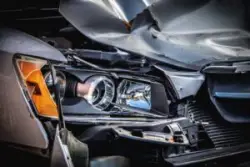
It is not surprising that our modern lives are built around the need for automobiles. Those who live and play in Las Vegas depend on cars to run errands, attend events, visit places, or meet up with others. The convenience of owning and driving a vehicle does come with its costs — including the risk of getting involved in an accident and being one of the tens of thousands who are hurt or killed on America’s roads. Aside from physical injuries, one frequent obstacle accident victims face is property damage including having to repair or replace their vehicle.
Total Loss
Costs of replacing or repairing a vehicle have increased over the years. This is particularly due to the sophistication of cars including powerful onboard computer systems, safety features, crash prevention sensors, and cameras. Today’s vehicles require skilled technicians and mechanics and often also demand proprietary parts. In layman’s terms, a vehicle that is “totaled” typically describes a car that has suffered severe damage that cannot be repaired. When it comes to insurance, however, the definition is more difficult to meet because not every badly damaged vehicle will be deemed totaled and not every totaled car will necessarily be badly damaged.
The definition of “totaled” or “total loss” used by insurance companies means that the cost of repairs plus the vehicle’s salvage value is more than the cash value of the vehicle if it were in working condition. While damage to a vehicle renders the car unrepairable and undrivable typically is a total loss, a car may be deemed totaled by an insurance company even if the damage is repairable and the vehicle is drivable. In some states, an insurance company can consider a vehicle a total loss even if the repair cost does not exceed the car’s cash value. Under Nevada law, insurance companies can treat a vehicle as a total loss if the repair costs are 65% of the car’s value.
Repairing Cars
When it does not make economic sense to repair a vehicle, it is deemed as “totaled” by the insurance company. Some vehicles, however, are worth more to their owners than to the insurance company. There may be a sentimental attachment to the car or repairs may be a cheaper option than purchasing, financing, or leasing a new and expensive car.
A car owner may want to keep a damaged car and have it repaired, even though the insurance company has deemed the vehicle “totaled.” While the insurance company may do so, there will likely be a limit — usually the repair cost minus the car’s salvage value, up to the cash value of the car if it were in working condition. If there is a difference in the costs, the owner will need to pay the remainder of the repair expenses.
When to Contact a Lawyer
Getting into a Nevada car accident can be stressful. When you have injuries that require medical attention, you do not want to also deal with property damage. This is particularly true if your vehicle is totaled and you are without transportation. The attorneys at H&P Law have been helping accident victims in Las Vegas and other parts of Nevada for years. Contact H&P Law today to discuss your case with one of our skilled personal injury attorneys.




